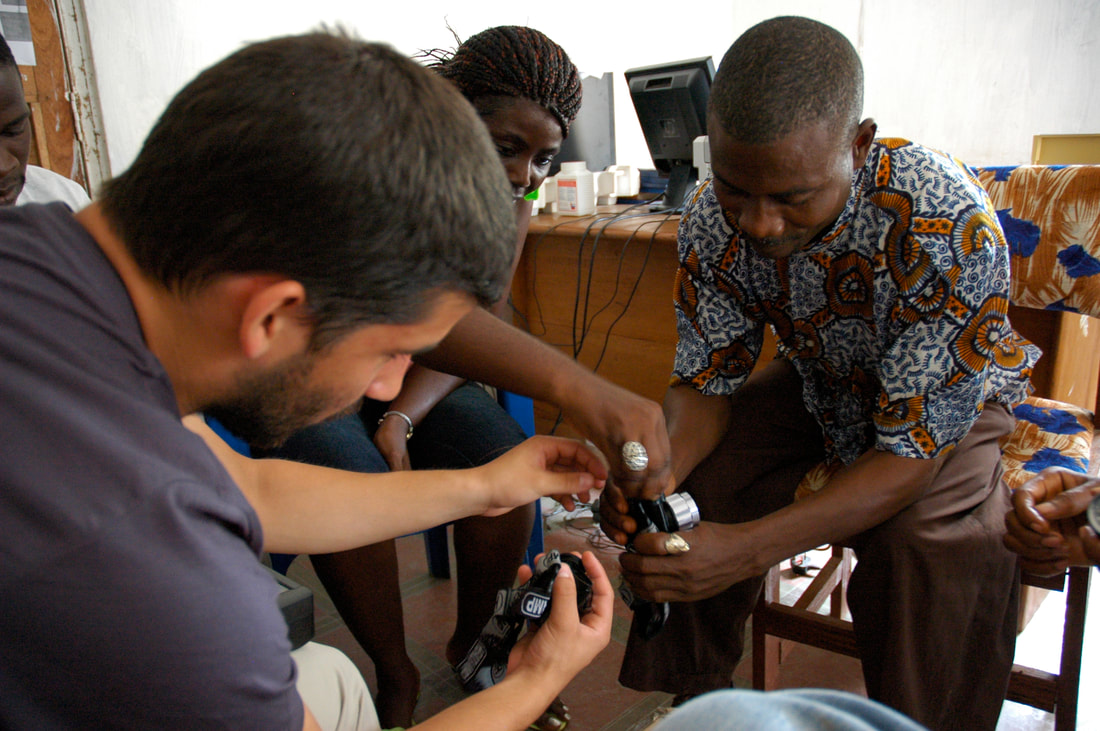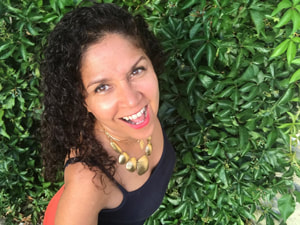A Student Finds His Purpose: To Help People Who Are Medically Underserved Around the World9/22/2018 For over 20 years, I've had the opportunity to mentor hundreds of students. Most of them have been from "underrepresented" or "minority" backgrounds. Many former students stay in touch with me over the years. So many of them tell me that I am the only minority professor that they encounter during their formative years of education, so we have an affinity, an unspoken understanding that we can do more, contribute more, achieve more. But that is not always expected. My students are children of immigrants, or immigrant themselves. They are people of color, they are seen as "disadvantaged" by their professors. Yet, sometimes all they needed is one good break, one mentor who looks like them, one great opportunity, one exciting experience, one person who cared, and this helps them to achieve the highest levels in their fields. Today in this guest post, I introduce you to Carlo Canepa, MD, one of the students who I mentored as an undergraduate in my International Exchange Program. He was a child immigrant from Peru, not too different from the immigrant children we hear about today. Now Dr. Canepa travels to remote parts of the world bringing ultrasound technology as an emergency medicine physician. He is currently working with the Commonwealth Healthcare Corporation http://chcc.gov.mp/, in Saipan, in the Northern Mariana Islands. Here is his story. My name is Carlo Canepa and I am an Emergency Medicine physician. I was born in Lima, Peru, and when I was 4 years old, my family fled a Maoist uprising to come to New York. I was raised in lower Manhattan. Although our family did not speak English, we fit right in with all the other families in the neighborhood and at my elementary school. There were kids from all over the world in my Kindergarten class. In another city, it may have felt like a disadvantage to be an immigrant, but in Manhattan in the 1980s, I fit right in. Being the child of immigrants also meant that we were all learning how to live in the US at the same time. We did not know about the SATs, how to apply to universities, or what a great college essay looked like. Again, this could have been a disadvantage, but it just meant that as a teenager I had to learn the system for myself and figure out how to make it work for me. Because I did not know any better, I only applied to 4 schools. I was lucky that Columbia University accepted me and gave me a very generous scholarship to attend.
As a college student, I did know which career I wanted to pursue. I knew that I did not want to sit behind a desk, that I wanted to use my hands, and that I wanted to be able to travel as part of my job. I have always been an intellectually curious person and I wanted lifelong learning to be part of my career. I also knew that I wanted my job to benefit others and to be a force for good in the world. I wanted a social mission to be built-in. Medicine was not a natural choice. No one in my family was a physician. I had no one to emulate. My decision to become a physician was calculated and long-deliberated. In the year before I was to enter medical school I was chosen for the Mount Sinai International Exchange Program for Minority Students by professor Luz Claudio. This program, and Dr. Claudio in particular, opened my eyes to the possibilities of what a career in medicine and research could be. I was assigned to a research project in Santiago, Chile, to conduct research on the health of healthcare workers. Alongside local mentors, I helped design a research project that included both qualitative and quantitative elements. I interviewed dozens of nurses at three different hospitals about their illnesses and what factors played a role in their decision to go to work while feeling ill. After completing the interviews, we compiled the data and analyzed it. The results indicated that the sick-leave policy (if you were ill for less than 3 days you were not paid) was playing a significant role in why nurses would go to work while feeling ill. And we discovered that they went to work while suffering from a variety of different diseases, some of them serious, a majority of them infectious. I presented my research findings at the International Congress on Occupational Health in Cape Town, South Africa, during my first year of medical school. The program was an amazing opportunity from start to finish, one that exposed me to research methodology, analysis, and presentation. It also taught me that the opportunities are out there; you just have to be willing to take a chance and to do the necessary work to take advantage of them. The skills I learned during that summer research project set me up for the rest of my career. The following year I went to Liberia to work on another research project on community health workers and their role in the HIV/AIDS and Tuberculosis epidemic occurring in Sub-Saharan Africa. This time, I did not have an in-person mentor to guide my research. Much of that summer was spent using the skills I had previously learned and applying them to a new project. This time in a much more rural and resource-poor environment. It was an extremely difficult few months, with no running water, no steady electricity, and I experienced a lot of weight loss. But I enjoyed it. I enjoyed the hardship and I knew that it was the kind of medicine and research that I wanted to practice: the highest need in the toughest conditions. I went on to graduate from Weill Cornell Medical College and finished an emergency medicine residency at New York University and Bellevue Hospitals, where I served as a chief resident in my final year. I then returned to Mount Sinai to complete an emergency ultrasound fellowship and last year I completed a wilderness medicine fellowship at the Massachusetts General Hospital and Harvard Medical School. Throughout those years I have had the opportunity to teach hundreds of scribes, medical students, residents, physician assistants, and even other fully trained physicians and nurses. While I continue to seek out mentors for myself, I have transformed into a mentor for others. I have conducted research focused primarily on the use of ultrasound in the emergency department and in austere and resource-poor setting. I have published several book chapters and cases in textbooks and am in the process of publishing several more research papers in journals. I have had the opportunity to work throughout the world in Chile, Liberia, Nepal, Rwanda, Madagascar, and the Western Pacific Islands. Writing does not come easily to me, especially scientific writing. It takes me a long time to compile the information, organize my findings, sit down and type it all out. But it is an important component of where I would like my career to go. I know that if I want to be a successful academic emergency medicine physician, research and scientific writing will be an integral aspect. But sometimes the most difficult things are the things that are most satisfying when they are completed. I do things precisely because they are hard. It gives me great satisfaction when I achieve them. The same is true of pursuing a career in academic medicine. It is not easy, but it is greatly satisfying. At this point in my career I get to decide where I work and what I focus my time on. My formal training is complete, but my education continues. I am 34 years old, but I continue to spend weekends in the library and at the coffee shop, reading papers, writing manuscripts, and thinking about what I want to do next. I get to pick my projects now, which is great, but it also means that it is on my shoulders to see each project through to its end point. I chose to live on a small island in the western Pacific for my first post-training job so that I could learn how to develop my clinical skills and to give back to a community that is in great need. I plan to continue working in poor and under-served communities, but also focusing my research on the projects that I find interesting. I have been extremely lucky to benefit from excellent education, training, and mentors. Now it is my turn to pay it back to those who have not been as fortunate and to those who come after me.
0 Comments
Guest Blog Post: Mayara Fontes, was a student in my International Research Training Program. Originally from Brazil, she has a Master’s Degree in Economics from University of Massachusetts. After completing her Master’s Degree, I sent her to work with my colleague, Dr. Leslie London at University of Cape Town, South Africa. The international research experience and the mentoring that we were able to offer Mayara opened new horizons for her career path. After her summer internship a few years ago, Mayara returned to South Africa to pursue her doctorate degree. Here is Mayara’s account of her educational trajectory from an unsure student, to a published research author, to a student with a clear career path and a bright future in the field of international health economics.
------------------ My name is Mayara Fontes Marx. I am originally from Brazil but moved to the USA when I was 18 years old. When I arrived to the USA, I could not speak or write in English. I started to study English at a community college where I participated in student clubs, served as a mentor, and received many accolades including a study-abroad scholarship to China. To continue my education, I transferred to the University of Massachusetts, Boston, where I graduated in 2014 with a Master’s in Applied Economics. Even though I had graduated with a master’s degree, I must say that I was completely lost. I knew I wanted to continue to do research, but I did not think that I had enough experience to pursue this path. It was then when my mentor, Eduardo Siqueira, advised me to apply to the International Exchange Program for Minority Students at Mount Sinai School of Medicine, directed by Dr. Luz Claudio*. Reading more about the program and their alumni, I felt like a minority inside of a minority program because my background was in economics and I had little experience in the medical sciences. However, I was determined to be part of this great program and had mentors that believed in my capacities and supported my application. I was fortunate to be selected to participate in the International Program and work on my own research project under the supervision of Dr. Leslie London at the University of Cape Town. One of the requirements of the program is to write a report in the form of a scientific paper worthy of publication. I never thought of myself as being a great writer, specially writing a scientific paper in my second language. I was not aiming for publication, but just to have the program requirement done. However, my mentors had a different plan. They gave me the support and the strength to pursue the most exciting accomplishment that an aspiring researcher could have- having their research published in a prestigious international journal. It was because of that perseverance, determination and outstanding mentoring that I finally, after three years, published my first scientific research paper as a first author. The excitement of collecting my own data, analyzing it, and co-authoring a manuscript, strengthened my passion for research and it became clear to me that a doctoral degree would be the path towards achieving my future career goals. Looking back, I remember the exciting challenges that I enthusiastically embraced. During those years I faced struggles, but they have helped shape the person that I am today. The Mount Sinai International Program also connected me with amazing PhD mentors in South Africa, Dr. London and Dr. Ataguba, whom I would not have met if it hadn’t been for the Mount Sinai International Research Training Program. My main career goal now is to work for a research non-profit organization doing health policy analyses. I really believe that research can improve people’s health. With perseverance, determination and my mentors backing me up, I am certain that I can accomplish my future goals. |
This section will not be visible in live published website. Below are your current settings: Current Number Of Columns are = 1 Expand Posts Area = 1 Gap/Space Between Posts = 8px Blog Post Style = card Use of custom card colors instead of default colors = 1 Blog Post Card Background Color = current color Blog Post Card Shadow Color = current color Blog Post Card Border Color = current color Publish the website and visit your blog page to see the results AuthorDr. Luz Claudio is an environmental health scientist, mother and consultant, originally from Puerto Rico. She is a tenured professor of environmental medicine and public health. Luz recently published her first book: How to Write and Publish a Scientific Paper: The Step-by-Step Guide. Dr. Claudio has internship programs and resources for young scientists. Opinions expressed in this blog are solely her own and may not reflect her employer's views. Categories
All
|
|
Dr. Luz Claudio
luz@drluzclaudio.com |
|
Opinions expressed in this website are solely Dr. Luz Claudio's own and may not reflect her employer's views. None of the information on this website should be taken as medical advice.
© COPYRIGHT 2018. ALL RIGHTS RESERVED.




 RSS Feed
RSS Feed